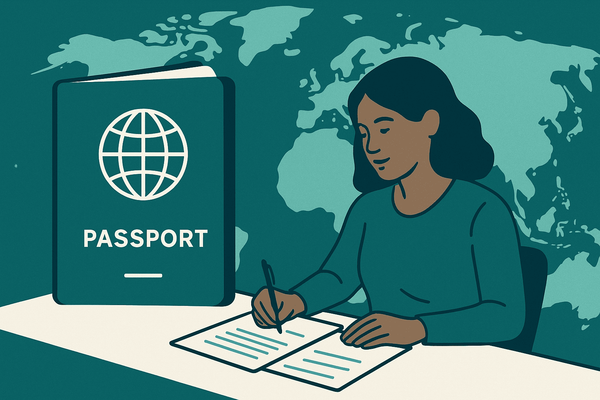Best US banks for American expats living abroad

Living abroad opens up exciting opportunities but can also come with unexpected challenges—especially when it comes to managing your finances. For American expats, finding a bank that meets your unique needs while staying compliant with U.S. regulations is key to maintaining a US bank account. Maintaining US financial accounts is also crucial to ensure compliance with regulations and proper management of assets while living abroad.
Often, expats face roadblocks like high ATM fees, account freezes, and limited access to international branches. Another big issue? Meeting the residential address requirements needed for banking and legal purposes.
In this article, we’ll explore the best bank options for American expats and provide tips on maintaining a U.S. residential address abroad.
Key considerations for choosing expat-friendly banks
When you’re abroad, the right bank can make all the difference in keeping your finances simple and accessible. Here are a few things to look for:
ATM accessibility and foreign transaction fees
Some banks offer free ATM access worldwide, while others charge each time you withdraw, especially for foreign ATM withdrawals. Look for banks that either have low international fees or reimburse ATM fees, so you’re not losing money with every withdrawal.
Multi-currency support and multi-currency accounts
Multi-currency accounts can be a lifesaver, especially if you’re earning in one currency but spending in another. Banks that support multiple currencies or provide competitive exchange rates can help you avoid expensive conversion fees.
Global reach, online banking, and customer support
Global banking often means needing assistance at odd hours. Some banks specialize in international service with 24/7 support, making it easier to solve issues without waiting days for a response.
Patriot Act compliance
The Patriot Act led to Customer Identification Program (CIP) rules that require banks to verify each customer’s identity, including a physical address, as part of their anti-money-laundering programs.
Many banks will not accept CMRA (Commercial Mail Receiving Agency) addresses—such as typical mail-forwarding services—to satisfy their CIP “residential address” requirement. Instead, they usually require a verifiable residential street address (or a permitted alternative such as a U.S. military or APO/FPO address), so it’s essential to have a realistic plan for meeting this requirement.

5 best banks for American expats
HSBC Expat
For American expats, finding a bank that meets your unique needs while staying compliant with U.S. regulations is key to maintaining a U.S. bank account. Keeping U.S. financial accounts in good standing also helps you stay on top of regulatory obligations and manage your assets properly while living abroad.
Their presence across continents allows convenient access no matter where you are, which can be especially useful for frequent movers.
However, these advantages come at a price; HSBC’s fees can be higher than those of local banks, making it a good fit for those who prioritize global reach over low costs.
Citibank
With one of the most extensive international networks among U.S. banks, Citibank is well-equipped for expats. It offers multi-currency accounts, making it easy to manage funds across borders, and provides reliable international customer support.
Transferring money between Citi accounts in different countries is simple and cost-effective, which can be a real plus if you have family or business ties back home.
However, some account types may have high fees, so reviewing their fee structures is essential.

Charles Schwab Bank
Charles Schwab Bank is known for its attractiveness to American expatriates, digital nomads, and frequent international travelers due to favorable account terms and low fees. Schwab accounts have no monthly maintenance fees, no foreign transaction fees, and offer unlimited worldwide ATM fee rebates, allowing users to withdraw cash globally without extra costs.
However, important differences emerge depending on whether an account holder uses a domestic (U.S.) or international (non-U.S.) residential address. When a client changes their address to an international residence, Schwab typically converts the account to international status through Schwab International.
This transition maintains core benefits but imposes some key limitations:
- Account Access and Eligibility: Americans abroad must apply through Schwab International, providing additional documentation like passports and proof of residence (e.g., utility bills). Schwab does not support all countries due to regulatory restrictions; clients in unsupported countries may lose account access or face severe restrictions (e.g., only allowed to sell, not buy investments).
- Investment Restrictions: Once marked as an international client, purchasing new U.S. mutual funds or CDs becomes restricted due to regulatory reasons. Clients usually retain existing investments but can’t add to mutual funds or CDs. Stocks and ETFs remain accessible, though EU/UK residents face specific limitations due to MiFID II regulations, which block the purchase of certain U.S.-based ETFs and funds.
- Bank Accounts vs. Brokerage Accounts: International users might have Schwab Bank checking and savings accounts closed upon relocating abroad. Instead, cash management often shifts to the Schwab One International Brokerage Account, which still provides similar functionality (debit card, check-writing capabilities), though technically under different protections (SIPC rather than FDIC).
- International Wire Transfers: Schwab Bank does not directly offer international wire transfers. However, Schwab’s international customer support can facilitate international wires through the brokerage account, usually at competitive rates but typically with a fee ($25–$50 per wire).
- Support Services: Schwab offers robust online and phone support for expats, including a dedicated international team available 24/5. However, the lack of physical international branches means all interactions must occur digitally or over the phone.
Overall, Schwab remains attractive for expatriates and digital nomads due to its low-fee structure, international ATM rebates, and support tailored to Americans abroad. The limitations primarily relate to regulatory constraints impacting investment choices, possible closures of bank accounts, and the lack of physical overseas branches.
Wise (formerly TransferWise)
Wise is known for its low-cost international transfers and multi-currency accounts, tailored for people with cross-border needs, helping to avoid international transaction fees.
Their app is user-friendly, with transparent and competitive exchange rates that avoid the hidden fees often found in traditional banking.
However, it’s important to note that Wise isn’t a traditional bank; it doesn’t offer services like loans or full-service checking, so it’s best suited as a secondary account for easy transfers. In the U.S., Wise operates as a money services business rather than an FDIC-insured bank, although certain balances can have pass-through FDIC insurance if you opt into specific features like interest.
Revolut
Revolut is a digital-first banking solution that offers a multi currency account, real-time exchange rates, and budgeting tools, ideal for expats with more flexible banking needs. Revolut’s platform is intuitive, especially for managing budgets across currencies.
However, the app-based service occasionally faces issues with customer support, so it may not suit those who require consistent customer service availability. In the U.S., Revolut works with partner banks that hold customer deposits and provide FDIC insurance up to standard limits, but the structure is still different from having a traditional checking account directly at a brick-and-mortar bank.
Checking accounts: features to look for
When selecting a checking account as an expat, there are several features to look for:
- Online banking: Look for banks that offer online banking services that allow you to manage your account, pay bills, and transfer funds from anywhere in the world.
- Mobile banking: A mobile banking app can be a convenient way to manage your account on the go.
- Low fees: Look for banks that offer low or no fees for services such as ATM withdrawals, foreign transactions, and account maintenance.
- Multi-currency accounts: If you need to manage multiple currencies, look for banks that offer multi-currency accounts that allow you to hold and manage funds in different currencies.
- US address: Many banks require a U.S. residential street address to open an account. Some may let you list a separate mailing address (including a mail-forwarding service) for correspondence, but they still rely on a verifiable residential address for CIP/KYC purposes. Always check a bank’s specific address rules and don’t assume a virtual mailbox or CMRA address alone will be acceptable.
By considering these features and challenges, expats can choose a US bank that meets their needs and provides the services they require to manage their finances effectively.
Maintaining a U.S. residential address for banking needs while abroad
For expats, choosing the right bank is only part of the equation; having a verifiable U.S. residential address is often essential for meeting financial institutions’ CIP and KYC requirements. However, many expats face obstacles, as traditional mail-forwarding addresses (often flagged as CMRA) are frequently not accepted by banks for legal and financial purposes.
Here are the best ways to maintain a compliant U.S. address:
Domicile services and maintaining a US address
Companies like SavvyNomad offer a bona fide residential U.S. street address in a tax-friendly state (e.g., Florida) and help you organize documentation, form filing, and proof-of-address packets that many financial institutions look for. The address is provided for documentary and correspondence purposes; actual acceptance always depends on each bank or broker’s own CIP/KYC policies and can change over time.
Using a residential-address or domicile service in a state with no personal income tax, such as Florida, can create administrative advantages—like having a consistent address for legal records, banking, and ID documents—but it doesn’t by itself create tax savings or guarantee that any particular institution, agency, or court will treat you as a resident.
This option can work very well for expats who need reliable, long-term address solutions to support banking and legal documentation. Eligibility for voting, state-tax treatment, and other residency-based benefits still depends on meeting the underlying legal rules in that state, not just having the address.

Friend or family member’s address
While this option may seem easy and affordable, it often lacks the necessary documentation to serve as valid proof of residence for banks or legal needs. Relying on friends or family also means inconveniences for both sides, as they may need to manage your mail, forward items, or verify address details upon request.
Virtual mailbox services
Virtual mailbox services allow expats to manage mail online through scanning and forwarding. However, most virtual addresses are flagged as CMRA addresses and are therefore not suitable for banking, legal, or financial purposes. While convenient for basic mail, this option cannot provide the official documentation required by banks.







